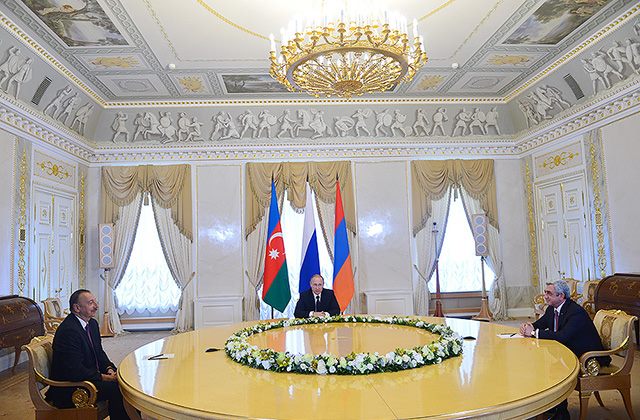With whom is Russia Playing the Karabakh Game?

OSCE MG Western Co-Chairs are preparing a high-level Sargsyan-Aliyev meeting. Although these days Alexander Lukashevich, Permanent Representative of the Russian Federation to the OSCE, stated that Russia is playing a leading role in NK conflict settlement, and that he doesn’t anticipate any breakthrough resolution from the visit of Frank-Walter Steinmeier, German Federal Minister for Foreign Affairs, to Yerevan and Baku, irrespective of the fact that as a result of trilateral meeting, held in St. Petersburg, the presidents expressed willingness to continue meeting with that format, the USA and France continue attempts of maintaining the balance in negotiations.
Throughout last week not only the visit of Steinmeier, OSCE Chairperson-in-Office , to the South Caucasus, telephone conversations of John Kerry, U.S. Secretary of State, with presidents of Armenia and Azerbaijan, but also Putin-Hollande telephone conversation have been recorded. John Kirby, U.S. Department Spokesman, informed that during the phone conversations issues referring to efforts directed to maintenance of ceasefire in NK conflict and the necessity of resuming negotiations on comprehensive settlement have been covered.
On the same day—June 30, telephone conversation was recorded between Vladimir Putin, RF president, and Francois Hollande, president of France. During the presidential telephone conversation Putin and Hollande discussed issues on NK conflict settlement, Ukrainian crisis and referendum held in Great Britain. According to the released statement Vladimir Putin introduced the results of the meeting with the participation of presidents of Russia, Armenia and Azerbaijan, launched in St. Petersburg on June 20.
During the telephone conversation the presidents expressed hope that the outcomes reached at the meeting will contribute to furthering of peaceful settlement of the conflict. However, it’s curious enough, that Elmar Mammadyarov, Azerbaijani Foreign Minister, continues to condition forthcoming presidential meetings by Russia in case, when deadlines of forthcoming meetings are already being shaped. At a joint press conference with Steinmeier, Elmar Mammadyarov touching upon the visit of Sergei Lavrov, RF Foreign Minister, to be paid to Baku, stated that it will depend on Lavrov’s visit whether the next meeting on NK conflict settlement will be held on presidential level or not.
Stanislav Tarasov, Russian analyst, columnist at Regnum news agency told “168 Hours” that the abovementioned observation by Mammadyarov once again proves that Baku links great expectations with Moscow and those expectations weren’t justified. “The Azerbaijani side considers, that Moscow should withdraw from the MG format and liabilities, and start acting in favor of the Azerbaijani side, however, Russia’s president fluently passed on the next stage of the meeting to France. Baku acts this way, as it’s sure that Western Co-Chairs support installation of mechanisms and expansion of Kasprzyk’s office, which isn’t in line with interests of Azerbaijan.
The latter failed to spilt the MG into two parts, moreover, as Russian and the U.S. Co-Chairs claim, they’re working towards preparing the documents on installation of investigative mechanisms, and progress is observed in France in this regard. Russian Co-Chair Igor Popov also touched upon the documents, and to all probabilities, they will be already ready at the meeting to be held in France,” Stanislav Tarasov said, adding that MG Co-Chairs act in accord, and it’s the turn of the sides to go to compromises.
Vladimir Yevseev, Head of Caucasus Department of the CIS Institute, touching upon the existent situation, told “168 Hours” that the situation around NK continues to be explosive, thus, the most important issue today, by which the Co-Chairs are busy as well, as strengthening of security measures, as without them after the April war it’ll be impossible to resume negotiations, particularly, in case, when Azerbaijani president didn’t clearly state on its intention on not settling the issue militarily. According to him, after the mechanisms Stepanakert should be mandatorily involved in the negotiation process to discuss settlement elements.
“It’s difficult to say how productive the forthcoming presidential meetings will be, in any case a positive impulse has been passed to negotiations through previous meetings, and adoption of mechanisms at this stage may be considered an achievement,” Yevseev said.
Neil Macfarlane, professor of International Relations at Oxford University, specialist on Russia and the South Caucasus, PhD in political science, positively assessed the process by the MG towards making presidential meeting frequent, launched after the April war. In his words, currently the Russian side seemingly puts forward its separate plans in Nagorno-Karabakh, attempting to move towards the direction of cooperation with the USA and France, with the perspective of settling wider relations with the West. This, according to Macfarlane, can’t but have a positive influence on NK conflict settlement, as formerly the potential of the Co-Chairs was split, conditioned by their separate interests: each of them was obliging its settlement scenario. And today, in his words, the Co-Chairs demand from the sides to maintain stability on the contact line due to expansion of liabilities of OSCE Chairperson-in-Office and installation of mechanisms.
“I think, finally, these mechanisms will be adopted, as there is a consolidated work between the Co-Chairs. During the settlement, in my conviction, rather subtle issues, like principles of self-determination and territorial integrity will emerge. There are still many nuances to be agreed in that issue. However, I think, there is still a lot of time to that stage,” he said.
To the question what may be anticipated from the meeting in France, Neil Macfarlane replied, that on account of disposition of Ilham Aliyev, Azerbaijani president, regarding installation of mechanisms, it’s difficult to touch upon serious complete success of those mechanisms. “However, I think, consolidation of the Co-Chairs will sober the sides, and they’ll accept proposals directed to stabilization of the situation. Without it the Co-Chairs realize that probability of war remains high,” the analyst said.
By Araks Martirosyan

























